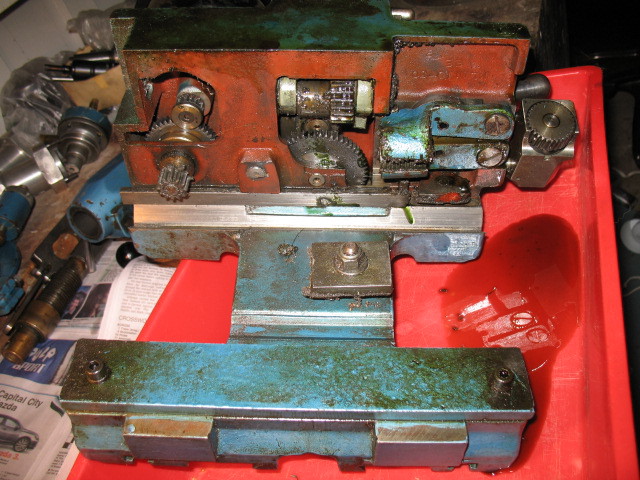Hi Every one,
I've visited the forum many times and it's great to see such a great community in action!
now for the inevitable plea for help...
I have an early TDS1 fair condition. To stop the saddle lifting when turning I have to use the carriage lock nut.
In the manual I downloaded it makes mention of a "saddle ant lift sliding clamp" which is situated underneath the bed ways.
and I don't seem to have one. Can any one tell me what this looks like and exactly where it should be?
Many thanks
Steve
Hi
It is a piece of metal held under the bed by a stud that screws to the underside of the apron.
It would be simple to make a replacement from mild steel.
The stud thread will be BSW.
The length is not critical but it is close to being a square. The piece is shown in this photo.

It is a piece of metal held under the bed by a stud that screws to the underside of the apron.
It would be simple to make a replacement from mild steel.
The stud thread will be BSW.
The length is not critical but it is close to being a square. The piece is shown in this photo.
Attachments:
Regards
Dazz
Dazz
Hi Steve - and welcome!
Dazz has answered your immediate question - but more fundamental is why is the saddle lifting anyway?
In normal turning, the saddle shouldn't be lifting - certainly for diameters less than the width of the bed.
For larger diameters, the cutting force could make the saddle 'rock' on the front 'V' - in which case maybe the depth of cut should be reduced.
Have you ever taken the saddle off and checked it is clean underneath? Or are there any 'dings' in the bed that need a gentle stoning off?
These lathes seem to have a 'belt and braces' approach which I've never quite worked out why - in addition to the centre anti-lift plate there is also a plate along the back of the saddle (seen in Dazz's photo, held on with 2 cap-head screws) that hooks under the back of the bed ways. I don't see why both are necessary - but maybe it reflects their educational market origins?
Andy
Dazz has answered your immediate question - but more fundamental is why is the saddle lifting anyway?
In normal turning, the saddle shouldn't be lifting - certainly for diameters less than the width of the bed.
For larger diameters, the cutting force could make the saddle 'rock' on the front 'V' - in which case maybe the depth of cut should be reduced.
Have you ever taken the saddle off and checked it is clean underneath? Or are there any 'dings' in the bed that need a gentle stoning off?
These lathes seem to have a 'belt and braces' approach which I've never quite worked out why - in addition to the centre anti-lift plate there is also a plate along the back of the saddle (seen in Dazz's photo, held on with 2 cap-head screws) that hooks under the back of the bed ways. I don't see why both are necessary - but maybe it reflects their educational market origins?
Andy
Hello,
I was interested by your post and had a look at my saddle, no anti-lift clamp. I milled one up copying the tailstock locking pad. lucky for me that denford had allready drilled and tapped the saddle ( 3/8 UNC ) used a bolt with 2 spring washers seperated by a washer to give it a bit more springing and it works a treat.
A quick mod I recommend doing!
I was interested by your post and had a look at my saddle, no anti-lift clamp. I milled one up copying the tailstock locking pad. lucky for me that denford had allready drilled and tapped the saddle ( 3/8 UNC ) used a bolt with 2 spring washers seperated by a washer to give it a bit more springing and it works a treat.
A quick mod I recommend doing!
Hi Steve.
It's just a piece of flat cast iron or steel that spans the underside of the ways and is held by a single bolt in the underside of the saddle. If you like I can photograph mine tomorrow.
It's just a piece of flat cast iron or steel that spans the underside of the ways and is held by a single bolt in the underside of the saddle. If you like I can photograph mine tomorrow.

